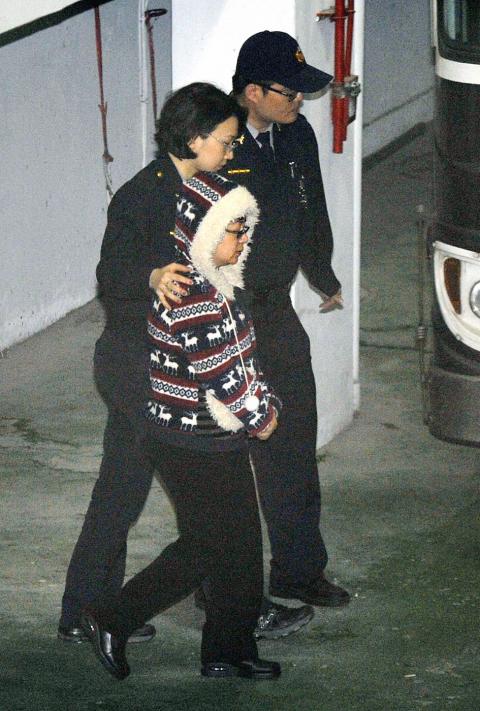Reversing its previous decision, the Taipei District Court yesterday granted prosecutors’ request to detain Chinese Nationalist Party (KMT) Taipei City Councilor Lai Su-ju (賴素如), a confidante of President Ma Ying-jeou (馬英九) who stands accused of taking bribes related to a high-profile Taipei development project.
Following a four-hour hearing and three-and-a-half hours of deliberation, the court, which on Friday night released Lai on NT$1.2 million (US$40,260) bail, ruled yesterday evening that Lai presented a flight risk and could collude with others to change their testimony, and decided that she should be detained. Many suspicious points remain, the court added, including that Lai claimed the NT$1 million she received from a contractor was a political donation and not a bribe, although she did not report any such donation.
Lai, former Taipei City Department of Rapid Transit Systems official Jia Er-ching (賈二慶) and construction contractor Cheng Hung-dao (程宏道) are facing allegations that they were involved in corruption in the bidding process for the Taipei Twin Towers (台北雙子星) project.

Photo: Chen Chih-chu, Taipei Times
The company they allegedly backed, Taipei Gateway International Development (太極雙星), won the tender in October last year with a NT$70 billion bid, but it lost its rights to the project last month, when it failed to put up a performance guarantee by the required deadline.
The court yesterday ordered that Cheng also be detained.
After the court hearing yesterday, Lai’s attorney told the press that Lai did not accept the reasons the court gave for detaining her and asked him to appeal the decision to the Taiwan High Court.
Prior to entering the court hearing yesterday morning, Lai said she would fully cooperate in the investigation to clear her name.
Prosecutors allege that Lai had struck a deal with the consortium to receive a NT$10 million bribe in three installments — NT$1 million as a down payment, NT$3 million after Taipei Gateway International Development had signed the contract with the Taipei City Government to build the Twin Towers and NT$6 million when construction started.
Lai said that she received the NT$1 million in 2011, but said she considered it to be a political donation. She said that she returned the money after realizing that it came from the consortium.
Lai has resigned from all of her KMT posts. She was the director of Ma’s KMT chairman’s office, deputy head of the party’s information department and a member of the KMT Central Standing Committee.
Additional reporting by CNA

MORE VISITORS: The Tourism Administration said that it is seeing positive prospects in its efforts to expand the tourism market in North America and Europe Taiwan has been ranked as the cheapest place in the world to travel to this year, based on a list recommended by NerdWallet. The San Francisco-based personal finance company said that Taiwan topped the list of 16 nations it chose for budget travelers because US tourists do not need visas and travelers can easily have a good meal for less than US$10. A bus ride in Taipei costs just under US$0.50, while subway rides start at US$0.60, the firm said, adding that public transportation in Taiwan is easy to navigate. The firm also called Taiwan a “food lover’s paradise,” citing inexpensive breakfast stalls

TRADE: A mandatory declaration of origin for manufactured goods bound for the US is to take effect on May 7 to block China from exploiting Taiwan’s trade channels All products manufactured in Taiwan and exported to the US must include a signed declaration of origin starting on May 7, the Bureau of Foreign Trade announced yesterday. US President Donald Trump on April 2 imposed a 32 percent tariff on imports from Taiwan, but one week later announced a 90-day pause on its implementation. However, a universal 10 percent tariff was immediately applied to most imports from around the world. On April 12, the Trump administration further exempted computers, smartphones and semiconductors from the new tariffs. In response, President William Lai’s (賴清德) administration has introduced a series of countermeasures to support affected

CROSS-STRAIT: The vast majority of Taiwanese support maintaining the ‘status quo,’ while concern is rising about Beijing’s influence operations More than eight out of 10 Taiwanese reject Beijing’s “one country, two systems” framework for cross-strait relations, according to a survey released by the Mainland Affairs Council (MAC) on Thursday. The MAC’s latest quarterly survey found that 84.4 percent of respondents opposed Beijing’s “one country, two systems” formula for handling cross-strait relations — a figure consistent with past polling. Over the past three years, opposition to the framework has remained high, ranging from a low of 83.6 percent in April 2023 to a peak of 89.6 percent in April last year. In the most recent poll, 82.5 percent also rejected China’s

PLUGGING HOLES: The amendments would bring the legislation in line with systems found in other countries such as Japan and the US, Legislator Chen Kuan-ting said Democratic Progressive Party (DPP) Legislator Chen Kuan-ting (陳冠廷) has proposed amending national security legislation amid a spate of espionage cases. Potential gaps in security vetting procedures for personnel with access to sensitive information prompted him to propose the amendments, which would introduce changes to Article 14 of the Classified National Security Information Protection Act (國家機密保護法), Chen said yesterday. The proposal, which aims to enhance interagency vetting procedures and reduce the risk of classified information leaks, would establish a comprehensive security clearance system in Taiwan, he said. The amendment would require character and loyalty checks for civil servants and intelligence personnel prior to